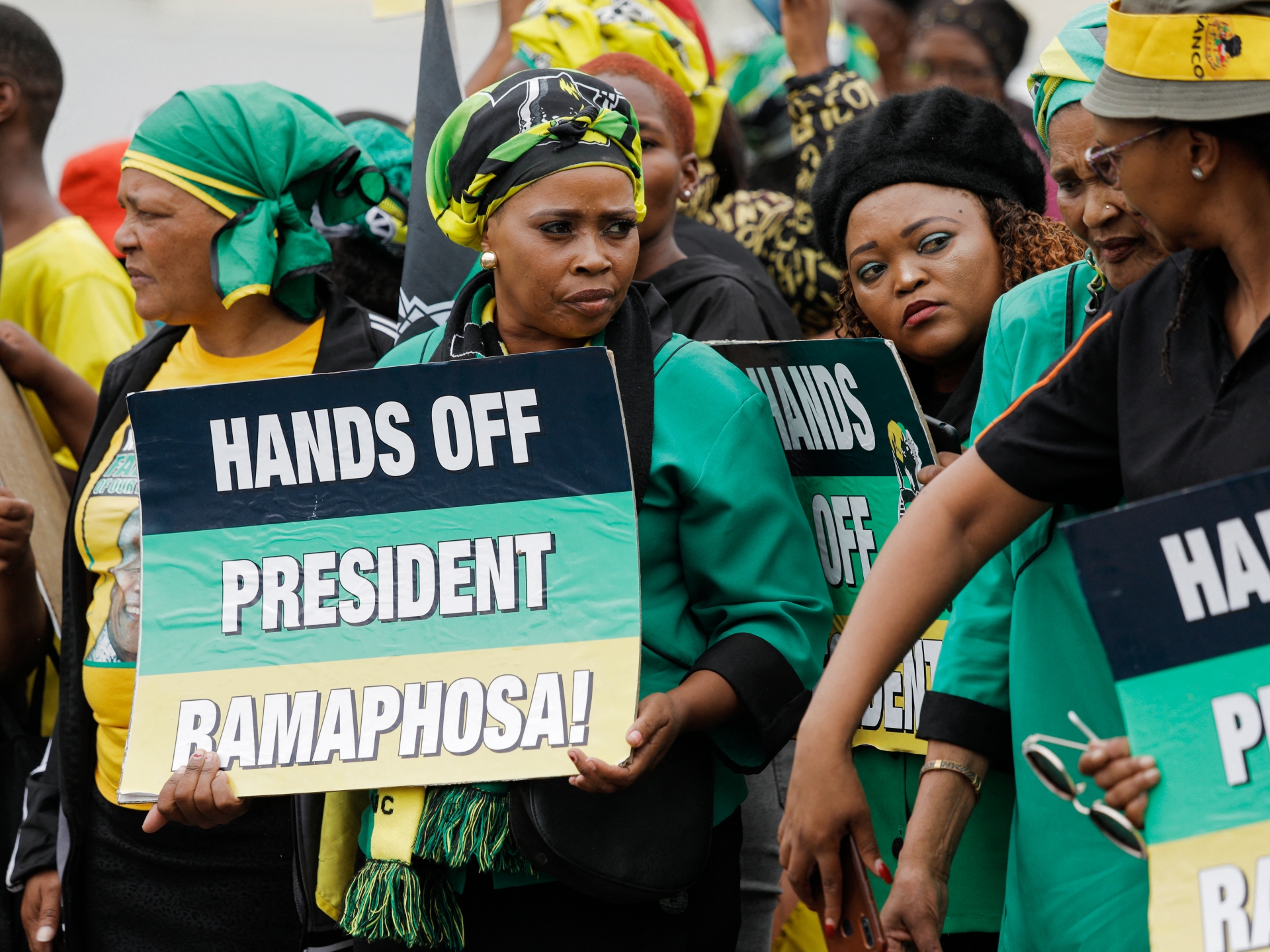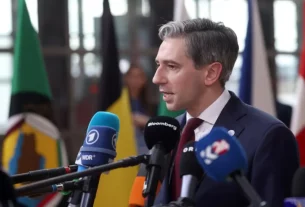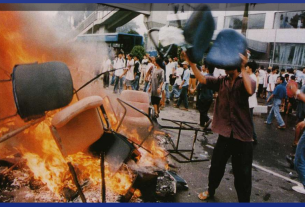South Africa’s parliament has voted not to start impeachment proceedings against President Cyril Ramaphosa over alleged misconduct and violation of the constitution in relation to a burglary scandal.
Tuesday’s vote comes after a November report found preliminary evidence he may have violated his oath of office.
Ramaphosa, who has run a tough campaign against corruption, is facing a scandal related to hundreds of thousands of dollars reported stolen in 2020 from Phala Phala, his private game farm in the Limpopo Province.
He has been accused of attempting to cover up a huge cash theft – initially reported as up to $4m, but Ramaphosa said it was about $580,000 – at his luxury farm, including having the burglars kidnapped and bribed into silence.
For the impeachment vote to have succeeded, it would have required the support of a two-thirds majority of MPs who voted during an extraordinary parliamentary session in Cape Town on Tuesday, December 13.
Ramaphosa’s African National Congress (ANC) occupies 230 of the 400 seats in parliament and he avoided impeachment proceedings with a vote of 214 to 148.
But this comes just three days before the ANC meets to elect a new leader, which it does every five years, and to decide whether to approve of Ramaphosa for a second term, meaning the possibility of his sacking this week still lingers.
Let’s take a look at a timeline of Ramaphosa’s presidency leading up to Tuesday’s vote:
December 18, 2017: Ramaphosa is elected ANC leader, replacing then-President Jacob Zuma, who is facing corruption scandals and accused of tarnishing the image of a party once led by Nelson Mandela. Ramaphosa promises to fight rampant corruption and revitalise the economy.
February 14, 2018: Zuma, who was in power since 2009, resigns following protests and multiple allegations of racketeering, corruption and the mismanagement of state resources. He leaves office ahead of a scheduled no-confidence vote against him in parliament.
February 15, 2018: Ramaphosa is sworn in as South Africa’s president, fewer than 24 hours after Zuma’s resignation. He pledges to work with the opposition and tackle corruption while finishing his predecessor’s term, which ends with elections the next year.
July 19, 2019: Public Protector Busisiwe Mkhwebane alleges (PDF) that Ramaphosa had “deliberately misled” parliament about a $32,500 donation for the 2017 campaign to succeed Zuma as head of the ANC. She adds there was also prima facie evidence of money laundering involving millions of rands in the handling of donations for the campaign.
August 12, 2019: Ramaphosa wins a legal battle with South Africa‘s anti-corruption watchdog over allegations that he misled parliament about a leadership campaign donation. He is cleared of all allegations in March 2020.
February 9, 2020: Criminals allegedly break into Ramaphosa’s Phala Phala wildlife farm in South Africa’s Limpopo Province and discover large sums of United States dollar bills hidden in various pieces of furniture.
July 7, 2021: Zuma begins serving 15 months in jail for contempt of court following his failure to appear at a corruption inquiry. In September, he is released on medical parole but in December, the High Court sets aside the parole decision and orders him to return to jail.
June 1, 2022: The former head of the South African State Security Agency, Arthur Fraser, files a criminal complaint against Ramaphosa, accusing him of kidnapping, bribery, money laundering, and “concealing a crime” in relation to the alleged theft on his Phala Phala farm in 2020. In a 12-page sworn statement, Fraser provides photographs, documents and closed-circuit television (CCTV) footage of the alleged theft taking place.
June 2: Ramaphosa issues a statement confirming a robbery took place at his Phala Phala farm, saying “proceeds from the sale of game were stolen”, but denying any wrongdoing.
July 15: About 300 protesters, mostly ANC members, march through Johannesburg to deliver a list of demands and call for a new president at the ruling party’s headquarters, citing the rising cost of living, fuel price hikes, incessant power cuts and rampant corruption in state institutions.
July 19: The Public Protector’s office says it will invoke subpoena powers to get answers from Ramaphosa over the alleged concealment of a theft at his luxury farmhouse after it opened a probe over potential breaches of the executive ethics code in June.
August 30: Ramaphosa refuses to answer questions in parliament related to the burglary and again reiterates that he wants “law enforcement agencies investigating the case to be given the space to do their work”.
September 9: Several opposition parties march to the office of acting Public Protector Kholeka Gcaleka to demand the release of a report on the alleged robbery.
September 15: National Assembly Speaker Nosiviwe Mapisa-Nqakula appoints an independent panel that includes the country’s top judge, former Chief Justice Sandile Ngcobo, to conduct a preliminary assessment on whether Ramaphosa should face an impeachment inquiry over alleged misconduct related to the burglary.
October 7: Zuma is released from prison following the expiry of his prison sentence for contempt of court.
November 7: Ramaphosa “categorically denies that he violated his oath in any way, and denies that he is guilty of “any of the allegations made against him”, during a testimony to a parliamentary panel examining whether he should face impeachment over an alleged cover-up of the heist at his farmhouse.
November 21: The Supreme Court of Appeal rules that the decision to release Zuma on early medical parole was “unlawful” and that he should return to prison to finish his sentence for contempt of court.
November 30: A special independent panel investigating whether Ramaphosa should face impeachment for allegedly covering up the crime that took place on his private farm submits its findings to parliament, two weeks before he faces a crucial party election.
December 1: The panel finds preliminary evidence that Ramaphosa violated his oath of office, and parliament is set to examine the report to decide whether to push ahead with impeachment proceedings next week.
December 3: Ramaphosa says he has no intention of resigning and will fight both politically and judicially.
December 5: Ramaphosa files court papers challenging the damning report that could lead to his impeachment for possible misconduct.
December 13: During an extraordinary parliamentary session in Cape Town, members of parliament vote on whether to initiate proceedings to remove Ramaphosa.
December 16-20: About 5,000 delegates of the ANC will attend its elective conference in the economic capital of Johannesburg to determine if Ramaphosa gets a second term or to pave the way for a successor. Potential candidates include presidential hopefuls like former Health Minister Zweli Mkhize, Tourism Minister Lindiwe Sisulu and former African Union Commission Chairperson Nkosazana Dlamini-Zuma, ex-wife of Ramaphosa’s former boss-turned-nemesis.



